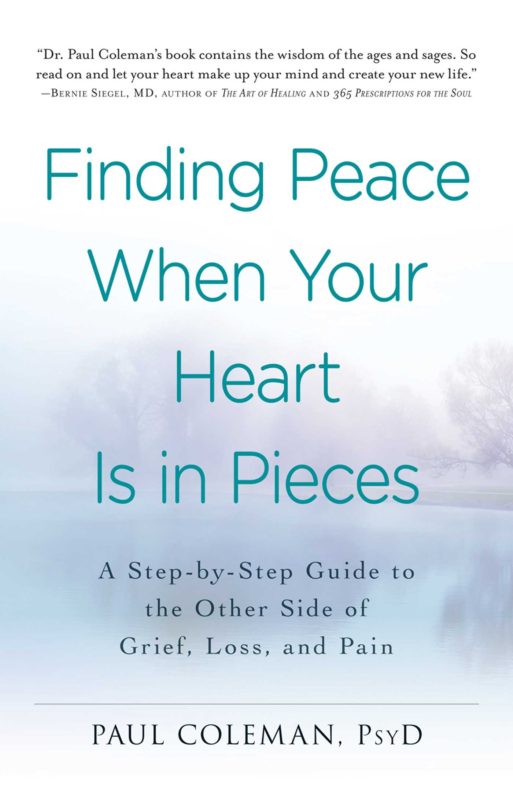 When you read Dr. Paul Coleman’s “Finding Peace When Your Heart is in Pieces,” don’t expect to get simple, cookie-cutter advice about loss. You won’t find trite tips such as “How to heal from a loss in five easy steps” or “Ten things you should do today to get over the death of a loved one.” Dr. Coleman takes a step back from the easy-fix solutions, reminding us that we all experience loss differently, and that we all need an individual method to heal.
When you read Dr. Paul Coleman’s “Finding Peace When Your Heart is in Pieces,” don’t expect to get simple, cookie-cutter advice about loss. You won’t find trite tips such as “How to heal from a loss in five easy steps” or “Ten things you should do today to get over the death of a loved one.” Dr. Coleman takes a step back from the easy-fix solutions, reminding us that we all experience loss differently, and that we all need an individual method to heal.
Dr. Coleman does include a few sections in the book that apply to most losses, but he goes on to explain that an individual’s experience might fall outside of this spectrum and still be entirely normal. He uses analogies from pop culture and stories about his patients to guide his readers through their own losses. In this sense, Dr. Coleman throws everything but the kitchen sink into the book in the hopes that at least one story will resonate. It’s this quality that makes the book such a good read for people experiencing a loss: One way or another, they will likely find something in the book that rings true for them.
That’s not to say that this book is by any means disorganized or cluttered with random thoughts.
That’s not to say that this book is by any means disorganized or cluttered with random thoughts. Quite the opposite — Dr. Coleman talks about the phases of grief he has seen during the years of his practice. However, he also explains his belief that relics from psychology’s “ancient history” are still making their way into people’s thoughts and experiences today, and that these are potentially harmful to us.
For example, Dr. Coleman refutes the traditional idea that there are five distinct stages of grief (denial, anger, bargaining, depression and acceptance) and that everyone goes through them in the same order. He explains that these stages not only feel limiting to many people who are going through a loss, but also can cause those who don’t experience grief in this way to think that there is something wrong with them. You may want to read his thoughts on “Why Doesn’t Everyone Go Through The Five Stages of Grief” here.
There is no “right” way to grieve.
Dr. Coleman’s theory seems obvious, but it’s something that we often forget. Some people will experience a loss through the five stages of grief. However, many others will experience just one or two of the stages, and others will experience all of them in jumbled order. There is no “right” way to grieve.

Credit: Dr. Paul Coleman
Another relic from traditional psychology that Dr. Coleman refutes is the idea that grieving for more than six months is unhealthy. He explains that some losses take far longer than six months to heal, and as long as a person’s life isn’t in complete shambles, that is perfectly OK. People who process grief over a longer period of time do not have a mental illness, nor should we treat them as if they do. It’s more helpful to let them feel their loss and process it in a way that lets them function in their daily lives.
The takeaway from Dr. Coleman’s book is that there are about 7 billion people on the planet right now, and each person has a distinct personality. In turn, every person has a unique relationship with every other person in the world. A mother who has lost her child is going to experience a different type of grief than a daughter who has lost her father, or a husband who has lost his wife. Knowing this, it’s impossible to tell someone how to heal from a loss. As Dr. Coleman points out, each of us should be allowed to embrace the idea that our losses are unique, and to be in-tune with what this means for us.
No matter what type of loss you have gone through, chances are good that you will find at least one piece of advice, one story or one bit of insight in “Finding Peace When Your Heart is in Pieces” that will help you heal.

 ”Finding Peace When Your Heart is in Pieces” by Dr. Paul Coleman
”Finding Peace When Your Heart is in Pieces” by Dr. Paul Coleman


 “Help Me, Helen”
“Help Me, Helen”
 Recovering Cremation Remains After the Los Angeles Fires
Recovering Cremation Remains After the Los Angeles Fires
 “As Tears Go By” by Marianne Faithfull
“As Tears Go By” by Marianne Faithfull














